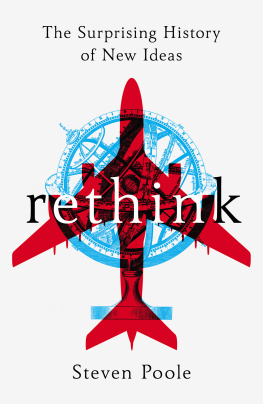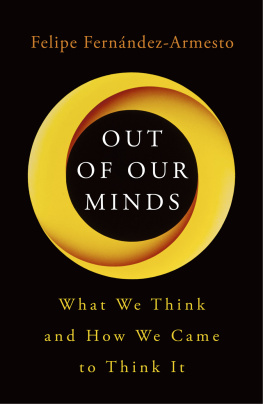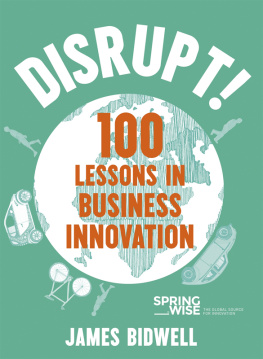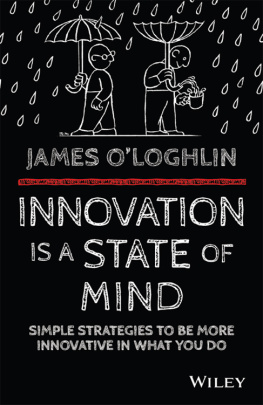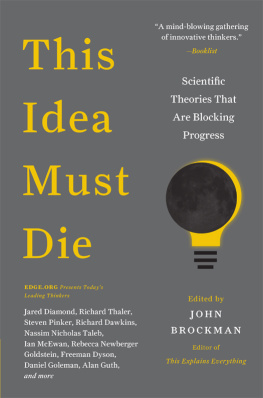About the Book
Think you know a good idea when you see one? Think again.
Rethink is the story of how old ideas that were mocked or ignored for centuries are now storming back to the cutting edge of research, and informing the way we lead our lives. Its the story of Grace Hopper, the programming language pioneer who allowed us to speak to computers; of Jean-Baptiste Lamarck, the groundbreaking evolutionary theorist whose name became a byword for failure; of Democritus, the laughing philosopher who inferred the atomic foundations of reality just by thinking about bread.
Using compelling examples from the worlds of philosophy, science, technology, politics and business, Steven Poole shows what we can learn by returning to discarded ideas, and considering them from a different perspective. He explains why todays chess grandmasters, quantum physicists and psychologists are mining the last 2,000 years of history for answers to the problems of the present. And he reveals how long-neglected thinkers could transform all of our everyday lives from improving the way boardrooms operate, to inspiring grand projects for social and political change.
Armed with this picture of the surprising evolution of ideas and their triumphant second lives, you will see the world differently and perhaps be better equipped to change it.
About the Author
Steven Poole is the award-winning author of four critically acclaimed works of non-fiction: Trigger Happy, Unspeak, You Arent What You Eat, and Who Touched Base In My Thought Shower? He has written widely on ideas, culture, language, and society for the Guardian, the New Statesman, the Times Literary Supplement, the Wall Street Journal, and many other publications.
Contents
Contents
Acknowledgements
This book owes much to the advice of Jon Elek, Harry Scoble, Daniel Loedel, and Schuyler W. Henderson. Thanks to Isabelle Mansuy, Jochen Runde, Andrew Pontzen, Galen Strawson, Rupert Sheldrake, Paul Fletcher, Barbara Jacobson, Marlies Cunnen, Iain Chambers, Carl Cederstrm, Tony Yates, Nigel Wilcockson, Nick Humphrey, Lucien Jones, and the staff of the British Library. And particular thanks to Izzy Mant, for all the coffee and everything else.
London, April 2016
Bibliography
Abrahams, Marc, This Is Improbable (London, 2014)
Adamson, Peter, Philosophy in the Hellenistic and Roman Worlds (Oxford, 2015)
Albats, Yevgenia, trans. Catherine A. Fitzpatrick, KGB: State Within a State (London, 1995)
Allan, Tony, Virtual Water (London, 2011)
Anderson, Curtis Darrel & Anderson, Judy, Electric and Hybrid Cars: A History (London, 2005)
Andrew, Christopher & Mitrokhin, Vasili, The Mitrokhin Archive: The KGB in Europe and the West (London, 1999)
Aubrey, John, ed. Andrew Clark, Brief Lives: Chiefly of Contemporaries (Oxford, 1898)
Ayres, Ian, Super Crunchers (London, 2007)
Bacon, Francis, trans. R. Ellis & James Spedding, Novum Organum (New York, 1905)
Ball, Philip, Curiosity: How Science Became Interested in Everything (London, 2012)
, The Devils Doctor (London, 2006)
Benedetti, Fabrizio, Placebo Effects: Understanding the Mechanisms in Health and Disease (Oxford, 2009)
Beyer, Kurt, Grace Hopper and the Invention of the Information Age (London, 2009)
Bobbitt, Malcolm, Taxi! The Story of the London Taxicab (London, 1998)
Bohr, Niels, Atomic Physics and Human Knowledge (New York, 1958)
Brent, Joseph, Charles Sanders Peirce: A Life (Bloomington, 1998)
Brooks, Michael, 13 Things That Dont Make Sense (London, 2009)
, At the Edge of Uncertainty (London, 2014)
Burger, Edward B. & Starbird, Michael, The 5 Elements of Effective Thinking (Princeton, 2012)
Burns, David D., Feeling Good: The New Mood Therapy (Kindle edn, 2012)
, The Feeling Good Handbook (New York, 1999)
Capri, Anton Z., Quips, Quotes, and Quanta: An Anecdotal History of Physics (London, 2011)
Chaucer, Geoffrey, ed. Larry D. Benson, The Riverside Chaucer (1987; Oxford, 2008)
Chomsky, Noam, Language and Problems of Knowledge (Cambridge, Mass., 1988)
Cou, Emile, Self-mastery through Conscious Autosuggestion (1920; New York, 2007)
Crick, Francis, Of Molecules and Men (1966; Seattle, 1967)
Dawkins, Richard, The Extended Phenotype (Oxford, 1982)
Diogenes Laertius, ed. R. D. Hicks, Lives of Eminent Philosophers (Cambridge, Mass., 1925; 1972)
Dyson, Freeman J., Disturbing the Universe (New York, 1979)
Eddington, Arthur S., ed. H. G. Callaway, The Nature of the Physical World (1928; Newcastle, 2014)
Edgerton, David, The Shock of the Old: Technology and Global History since 1900 (2007; Oxford, 2011)
Ensmenger, Nathan, The Computer Boys Take Over (Cambridge, Mass., 2010)
Epictetus, trans. P. E. Matheson, Discourses Books 1 & 2 (New York, 2004)
Epstein, Edward Jay, Deception: The Invisible War between the KGB and CIA (New York, 1989)
Feyerabend, Paul, Against Method, 4th edn (1988; London, 2010)
, Farewell to Reason (London, 1987)
Firestein, Stuart, Ignorance: How It Drives Science (Oxford, 2012)
Freedman, Lawrence, Strategy: A History (2013; Oxford, 2015)
Freud, Sigmund, trans. Anthea Bell, A Case of Hysteria (Dora) (Oxford, 2013)
Galton, Francis, Inquiries into Human Faculty and Its Development, 2nd edn (1907; Public Domain/Kindle)
Golitsyn, Anatoliy, New Lies for Old: The Communist Strategy of Deception and Disinformation (London, 1984)
Gould, Stephen Jay, Ontogeny and Phylogeny (London, 1977)
Graeber, David, The Utopia of Rules (London, 2015)
Grant, Edward, Planets, Stars, and Orbs: The Medieval Cosmos, 12001687 (Cambridge, 1996)
Grof, Stanislav & Halifax, Joan, The Human Encounter with Death (New York, 1977)
Habermas, Jrgen, The Future of Human Nature (Oxford, 2003)
Harris, Sam, Free Will (New York, 2012)
Hawthorne, John, Metaphysical Essays (Oxford, 2006)
Heath, Chip & Heath, Dan, Made to Stick: Why Some Ideas Take Hold and Others Come Unstuck (London, 2007)
Helmholtz, Hermann von, ed. James P. C. Southall, Helmholtzs Treatise on Physiological Optics (New York, 1925)
, ed. David Cahan, Science and Culture: Popular and Philosophical Essays (Chicago, 1995)
, trans. E. Atkinson, Popular Lectures on Scientific Subjects, Vol. II (1895; London, 1996)
, trans. Alexander Ellis, On the Sensations of Tone as a Physiological Basis for the Theory of Music (1875; Bristol, 1998)
Heuer, Richards J., Psychology of Intelligence Analysis (Virginia, 1999)
Holton, Gerald, The Scientific Imagination (1978; Cambridge, Mass., 1998)
Hoyle, Fred, Home is Where the Wind Blows (Mill Valley, Calif., 1994)
, The Nature of the Universe (Oxford, 1960)
James, William, ed. Giles Gunn, Pragmatism and Other Writings (London, 2000)
Johnson, Scott C., Ghost in the Cell (Matter, 2013)
Jones, Lucien, The Transparent Head

